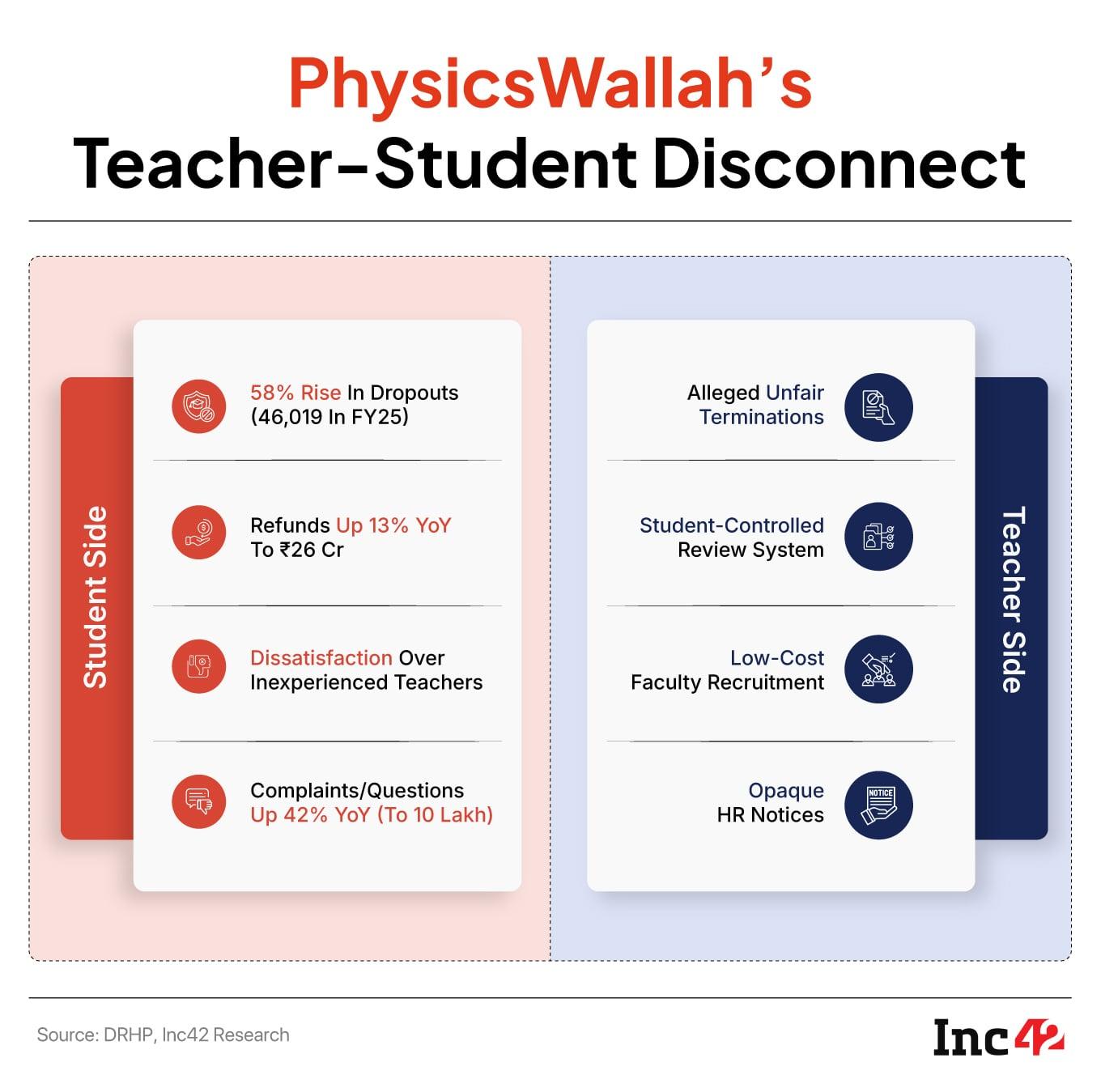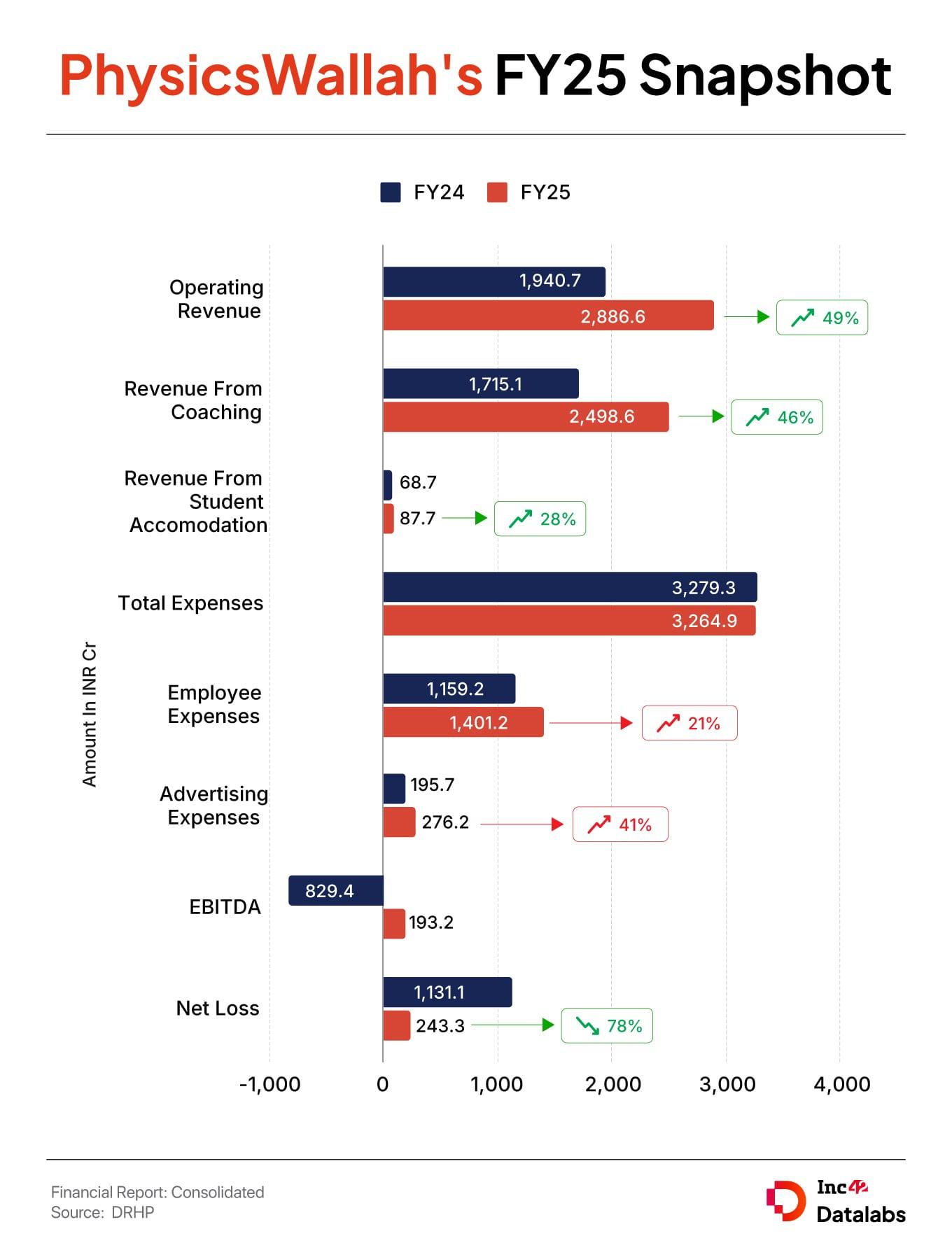Even as Alakh Pandey-led PhysicsWallah readies itself to become the first edtech startup to go public, there’s one potential challenge that can snowball into a bigger mess.
In short, PhysicsWallah has a faculty problem, with teachers alleging unfair termination, an opaque review system and a focus on student retention rather than outcomes.
According to its pre-IPO disclosures, PW underwent a restructuring exercise in FY24 and FY25, which particularly impacted faculty members. Faculty attrition rate was 18% in FY23, and then grew to 40.4% in FY24 before coming down to 26% in FY25.
Inc42 has learnt that the startup has continued to let go of faculty members on allegedly unclear grounds even in FY26.
Sources close to the company and former teachers said layoffs have happened as recently as July 2025. This by itself is not a major issue, but it’s the manner of the dismissals and terminations that have caused some consternation among teachers.
Speaking to Inc42, some faculty members said they received an email from the Physicswallah human resources team seeking “Mutual Separation” in June and July 2025.
Faculty members allege that the startup decided to terminate the contract in the middle of an academic year, something that is unheard of in the edtech space.
PhysicsWallah Vs TeachersSome of these teachers have pursued legal action to challenge these layoffs, alleging unfair termination and breach of contract, according to emails seen by Inc42.
Emails sent to PW management from legal teams representing former employees sought compensation for the allegedly unfair termination. Moreover, the terminated employees allege discrepancies in their full and final settlements, stating that most of them received only one month’s salary instead of the two months’ pay specified in their original appointment letter.
Inc42 has also seen emails from PW’s management sent in response claiming that information about the change in notice periods for employees was published on the company’s HR dashboard. At the moment, the dispute remains open.
However, the trickle of legal notices could ultimately become a significant problem for PW in the long run. This is something the company acknowledges that teacher-student disputes and other issues concerning educators could become a major issue.
“In 2023, a video of a staff member pushing a student in one of our offline centres was circulated on social media. Based on an internal assessment, we terminated the staff member involved in this incident. In another incident in 2023, a student was seen threatening a faculty member with a slipper over a video call,” the company stated in its DRHP about the kind of action it has taken in recent disputes.
This is not the first instance where tensions have emerged between PW and its faculty members. Several media reports have highlighted ongoing challenges, primarily arising from conflicts between the teaching staff and the management.

In 2022, in a viral video that was circulated over social media, a faculty member was seen threatening to physically abuse a student who was bombarding “BTS Army” in the comments section of an offline class.
Additionally, in a widely circulated video, three PW teachers were accused of taking bribes from a competitor, and allegations were made about internal politics at the edtech company.
But these concerns aside, teachers also complain about not having enough say in their review process as a result of which they are often terminated over performance issues without any say in the process.
Inc42 sent a detailed questionnaire to PhysicsWallah, but the company declined to comment on the particulars related to teacher concerns.
To address concerns around teacher performance, PhysicsWallah introduced a review system that allows students to provide regular feedback on their teachers. While such ratings are standard in edtech, at PW, students can actually vote for a teacher to be removed from their course.
This student rating is even mentioned in the DRHP, where PW describes it as a data-driven performance evaluation system based on multiple parameters, including student feedback, planner adherence, and subject matter expert evaluations.
Before 2020, when the company was largely a YouTube network, PW had set a benchmark of 4.8/5 for every teacher, and anything below this was considered unsatisfactory. It has added a similar component to its offline business; however, these ratings are completely dependent on students, with no input from the management.
While Inc42 couldn’t ascertain the current benchmark standard with respect to teachers’ ratings, the DRHP reveals that the number of complaints and questions from students has significantly increased (42%) to 10 Lakh in FY25 from 7.4 Lakh in March 2024.
While the number of teachers, including full-time and part-time staff, has increased by 40% to 5,096 from 3,654 in FY24, and so has the number of enrolled students.
Several teachers call the rating system unfair. “There are various issues. One is that you cannot compel some students to work harder since this can impact your rating, and you might end up losing your job. This has also given a free hand to students who know that the teachers are working for them and has changed the balance in the classroom,” one senior faculty member told us on condition of anonymity.
Many believe that ratings should not be the only way to gauge the performance of teachers, since it leads to a lot of rift between students and teachers
Employees, such as the one quoted above, say that while hiring can occur en masse for centres, as a pan-India educational institution, PW has an obligation to be more transparent in its recruitment process.
Several faculty members further highlighted that managers at offline centres, responsible for student enrollment and operations, often failed to address concerns from teachers. Teachers feel there was a bias towards retaining students and some managers or centre heads even held the authority to terminate faculty members.
The High Cost Of Edtech“The centre heads let go of teachers at their whim and fancy. You have to be in their good books or else tomorrow you won’t have jobs,” said a former PW senior teacher on the condition of anonymity.
One of the stark realities of the edtech business is that hiring good educators with a strong following is not inexpensive. Plus teacher attrition leads to student attrition.
This has led to increased unsatisfactory outcomes for students, resulting in higher dropout rates. In FY25, the startup’s total dropout jumped by 58% YoY to 46,019. This resulted in a higher refund rate, which jumped by 13% YoY to INR 26 Cr.
The startup’s overall loss decreased 78% to INR 243.3 Cr in FY25 from INR 1,131.1 Cr in the previous year, and its revenues increased 49% to INR 2,886.6 Cr from INR 1,940.7 Cr in FY24. The number of paying users increased by 22% YoY to 4.46 Mn.
There’s also some merit to the argument that PhysicsWallah’s early success was driven by deep discounts and aggressive pricing, but sustaining it could prove difficult.
In particular, PhysicsWallah’s revenue from operations has declined by nearly 40% in Kota, its first major offline hub, due to falling enrollments. Moreover, the startup’s dependence on JEE, NEET, and other foundation courses adds another layer of risk, where student attrition will lead to revenue evaporating in core verticals.

PW has been known to be an affordable learning platform for the masses — its entire pitch revolves around making education more accessible, even by running physical coaching centres. On average, PW charges INR 40,000 in fee, which is significantly lower compared to competitors such as Unacademy, Allen, or Aakash, whose pricing starts north of INR 1 Lakh.
This is perhaps why it has to keep such a tight check on its hiring and employee costs.
With a single offline centre in 2022 to 198 coaching centres across 109 Indian cities in 2025, the offline vertical contributes to almost half of the startup’s total operating revenue. So naturally, there will be a lot of focus on cutting costs here as PW looks to become profitable.
So how has PW managed to outprice its competitors and retain students at its low cost base?
For one, PW’s courses are run by subject matter experts, but there is a layer of doubt solvers that students interact with more often. This has led to concerns from students. Industry insiders say that more than half the cost of running a centre is for teacher salaries.
To make each centre profitable and improve overall profitability, PW is said to have hired low-cost teachers with minimal experience.
In some centres in central India, sources allege that under-qualified graduate students and undergraduates are appointed to solve doubts for students preparing for NEET/ JEE. “The only way they can continue to offer such low-cost offline classes is by cutting the faculty cost. They went for hiring freshers straight out of college to teach students,” said an industry insider who has worked with edtech startups in the offline space.
For its part, PW has acknowledged that it hires faculty members without any prior experience. In the DRHP, it stated that the startup hired faculty, specifically faculty who have no prior or limited years of experience, who go through our dedicated faculty training program. This enables new hires to navigate the PW ecosystem and tools.
Some sources alleged that this training period has not remained consistent over time, and its duration often varies.
Teachers Are Everything In Edtech“Unqualified faculty members who are closer to managers will be retained, and the only concern is to keep the centre running smoothly and dispelling any dissent around teaching quality,” another PW employee alleged, adding that often students were able to clear doubts of other students better than the faculty.
Even PhysicsWallah knows that teachers carry considerable weight in the edtech and coaching industries.
This is most notably seen in how the company leveraged the brand of its cofounder, Alakh Pandey, in the early days. Teachers, with their cult-like following among students, became central to the edtech’s rapid growth and winning student trust, particularly online.
However, the online popularity of PW’s marquee teachers has not boosted student enrollment at its offline coaching centres.
“Whenever PW expands into a new region or launches a fresh category in the offline space, its Celebrity teachers are often brought in to headline the promotion,” said another industry insider familiar with the startup’s operations. “However, once the centre starts functioning, these star educators rarely take classes. Instead, the bulk of teaching responsibilities falls on relatively inexperienced or lesser known faculty.”
This disconnect has reportedly led to growing dissatisfaction among students, also contributing to a surge in dropouts, as highlighted earlier in the article.
While PW continues to scale rapidly by opening new coaching centres and attracting a growing student base, sustaining this momentum will require more than just expansion and adding new brands under its umbrella.
In the long run, the success of any coaching centre rests on two pillars, students and teachers. For PW, retaining student trust means retaining teachers. BYJU’S learnt this the hard way.
The moment the quality of courses took a backseat to sales and the moment students were being retained at any cost, teachers suffered, and the platform crumbled. Striking the right balance going forward will be critical for PhysicsWallah as it gears up for the IPO.
Edited By Nikhil Subramaniam
The post Can PhysicsWallah Fix Its Teacher Problem? appeared first on Inc42 Media.
You may also like

SC revises compensation to over Rs 60 lakh to accident victim kin

Paradip Port Authority Signs Concession Agreement With AM/NS Ports; Check Project Details

Woman who buys £6 bag in charity shop gets a big surprise when she opens it

Top 5 biggest openers of India 2025: SRK out, Pawan Kalyan in

'Forgotten' food that can help Brits cut cholesterol and give them 'longer lasting energy'






